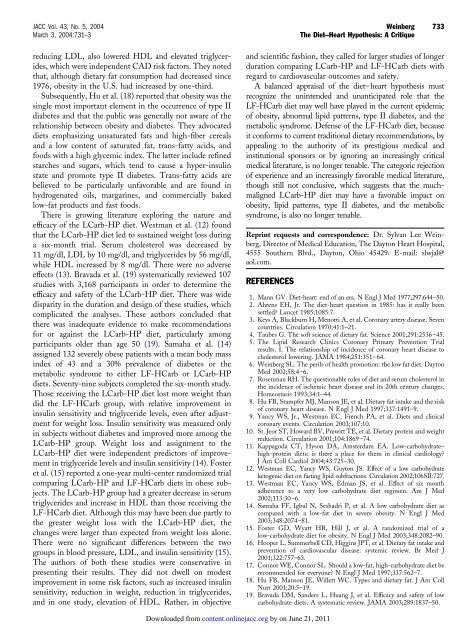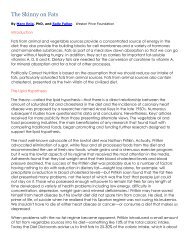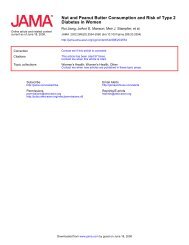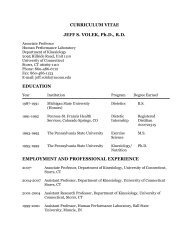The Diet–Heart Hypothesis: A Critique. - Nutrition and Metabolism ...
The Diet–Heart Hypothesis: A Critique. - Nutrition and Metabolism ...
The Diet–Heart Hypothesis: A Critique. - Nutrition and Metabolism ...
Create successful ePaper yourself
Turn your PDF publications into a flip-book with our unique Google optimized e-Paper software.
JACC Vol. 43, No. 5, 2004March 3, 2004:731–3Weinberg<strong>The</strong> <strong>Diet–Heart</strong> <strong>Hypothesis</strong>: A <strong>Critique</strong>733reducing LDL, also lowered HDL <strong>and</strong> elevated triglycerides,which were independent CAD risk factors. <strong>The</strong>y notedthat, although dietary fat consumption had decreased since1976, obesity in the U.S. had increased by one-third.Subsequently, Hu et al. (18) reported that obesity was thesingle most important element in the occurrence of type IIdiabetes <strong>and</strong> that the public was generally not aware of therelationship between obesity <strong>and</strong> diabetes. <strong>The</strong>y advocateddiets emphasizing unsaturated fats <strong>and</strong> high-fiber cereals<strong>and</strong> a low content of saturated fat, trans-fatty acids, <strong>and</strong>foods with a high glycemic index. <strong>The</strong> latter include refinedstarches <strong>and</strong> sugars, which tend to cause a hyper-insulinstate <strong>and</strong> promote type II diabetes. Trans-fatty acids arebelieved to be particularly unfavorable <strong>and</strong> are found inhydrogenated oils, margarines, <strong>and</strong> commercially bakedlow-fat products <strong>and</strong> fast foods.<strong>The</strong>re is growing literature exploring the nature <strong>and</strong>efficacy of the LCarb-HP diet. Westman et al. (12) foundthat the LCarb-HP diet led to sustained weight loss duringa six-month trial. Serum cholesterol was decreased by11 mg/dl, LDL by 10 mg/dl, <strong>and</strong> triglycerides by 56 mg/dl,while HDL increased by 8 mg/dl. <strong>The</strong>re were no adverseeffects (13). Bravada et al. (19) systematically reviewed 107studies with 3,168 participants in order to determine theefficacy <strong>and</strong> safety of the LCarb-HP diet. <strong>The</strong>re was widedisparity in the duration <strong>and</strong> design of these studies, whichcomplicated the analyses. <strong>The</strong>se authors concluded thatthere was inadequate evidence to make recommendationsfor or against the LCarb-HP diet, particularly amongparticipants older than age 50 (19). Samaha et al. (14)assigned 132 severely obese patients with a mean body massindex of 43 <strong>and</strong> a 30% prevalence of diabetes or themetabolic syndrome to either LF-HCarb or LCarb-HPdiets. Seventy-nine subjects completed the six-month study.Those receiving the LCarb-HP diet lost more weight th<strong>and</strong>id the LF-HCarb group, with relative improvement ininsulin sensitivity <strong>and</strong> triglyceride levels, even after adjustmentfor weight loss. Insulin sensitivity was measured onlyin subjects without diabetes <strong>and</strong> improved more among theLCarb-HP group. Weight loss <strong>and</strong> assignment to theLCarb-HP diet were independent predictors of improvementin triglyceride levels <strong>and</strong> insulin sensitivity (14). Fosteret al. (15) reported a one-year multi-center r<strong>and</strong>omized trialcomparing LCarb-HP <strong>and</strong> LF-HCarb diets in obese subjects.<strong>The</strong> LCarb-HP group had a greater decrease in serumtriglycerides <strong>and</strong> increase in HDL than those receiving theLF-HCarb diet. Although this may have been due partly tothe greater weight loss with the LCarb-HP diet, thechanges were larger than expected from weight loss alone.<strong>The</strong>re were no significant differences between the twogroups in blood pressure, LDL, <strong>and</strong> insulin sensitivity (15).<strong>The</strong> authors of both these studies were conservative inpresenting their results. <strong>The</strong>y did not dwell on modestimprovement in some risk factors, such as increased insulinsensitivity, reduction in weight, reduction in triglycerides,<strong>and</strong> in one study, elevation of HDL. Rather, in objective<strong>and</strong> scientific fashion, they called for larger studies of longerduration comparing LCarb-HP <strong>and</strong> LF-HCarb diets withregard to cardiovascular outcomes <strong>and</strong> safety.A balanced appraisal of the diet–heart hypothesis mustrecognize the unintended <strong>and</strong> unanticipated role that theLF-HCarb diet may well have played in the current epidemicof obesity, abnormal lipid patterns, type II diabetes, <strong>and</strong> themetabolic syndrome. Defense of the LF-HCarb diet, becauseit conforms to current traditional dietary recommendations, byappealing to the authority of its prestigious medical <strong>and</strong>institutional sponsors or by ignoring an increasingly criticalmedical literature, is no longer tenable. <strong>The</strong> categoric rejectionof experience <strong>and</strong> an increasingly favorable medical literature,though still not conclusive, which suggests that the muchmalignedLCarb-HP diet may have a favorable impact onobesity, lipid patterns, type II diabetes, <strong>and</strong> the metabolicsyndrome, is also no longer tenable.Reprint requests <strong>and</strong> correspondence: Dr. Sylvan Lee Weinberg,Director of Medical Education, <strong>The</strong> Dayton Heart Hospital,4555 Southern Blvd., Dayton, Ohio 45429. E-mail: slwjal@aol.com.REFERENCES1. Mann GV. Diet-heart: end of an era. N Engl J Med 1977;297:644–50.2. Ahrens EH, Jr. <strong>The</strong> diet-heart question in 1985: has it really beensettled? Lancet 1985;1085:7.3. Keys A, Blackburn H, Menotti A, et al. Coronary artery disease. Sevencountries. Circulation 1970;41:1–21.4. Taubes G. <strong>The</strong> soft science of dietary fat. Science 2001;291:2536–45.5. <strong>The</strong> Lipid Research Clinics Coronary Primary Prevention Trialresults. I. <strong>The</strong> relationship of incidence of coronary heart disease tocholesterol lowering. JAMA 1984;251:351–64.6. Weinberg SL. <strong>The</strong> perils of health promotion: the low fat diet. DaytonMed 2002;58:4–6.7. Rosenman RH. <strong>The</strong> questionable roles of diet <strong>and</strong> serum cholesterol inthe incidence of ischemic heart disease <strong>and</strong> its 20th century changes.Homeostasis 1993;34:1–44.8. Hu FB, Stampfer MJ, Manson JE, et al. Dietary fat intake <strong>and</strong> the riskof coronary heart disease. N Engl J Med 1997;337:1491–9.9. Yancy WS, Jr., Westman EC, French PA, et al. Diets <strong>and</strong> clinicalcoronary events. Circulation 2003;107:10.10. St. Jeor ST, Howard BV, Prewitt TE, et al. Dietary protein <strong>and</strong> weightreduction. Circulation 2001;104:1869–74.11. Kappagoda CT, Hyson DA, Amsterdam EA. Low-carbohydrate–high-protein diets: is there a place for them in clinical cardiology?J Am Coll Cardiol 2004;43:725–30.12. Westman EC, Yancy WS, Guyton JS. Effect of a low carbohydrateketogenic diet on fasting lipid subfractions. Circulation 2002;106SII:727.13. Westman EC, Yancy WS, Edman JS, et al. Effect of six monthadherence to a very low carbohydrate diet regimen. Am J Med2002;113:30–6.14. Samaha FF, Igbal N, Seshadri P, et al. A low carbohydrate diet ascompared with a low-fat diet in severe obesity. N Engl J Med2003;348:2074–81.15. Foster GD, Wyatt HR, Hill J, et al. A r<strong>and</strong>omized trial of alow-carbohydrate diet for obesity. N Engl J Med 2003;348:2082–90.16. Hooper L, Summerbell CD, Higgins JPT, et al. Dietary fat intake <strong>and</strong>prevention of cardiovascular disease: systemic review. Br Med J2001;322:757–63.17. Connor WE, Connor SL. Should a low-fat, high-carbohydrate diet berecommended for everyone? N Engl J Med 1997;337:562–7.18. Hu FB, Manson JE, Willett WC. Types <strong>and</strong> dietary fat. J Am CollNutr 2001;20:5–19.19. Bravada DM, S<strong>and</strong>ers L, Huang J, et al. Efficacy <strong>and</strong> safety of lowcarbohydrate diets. A systematic review. JAMA 2003;289:1837–50.Downloaded from content.onlinejacc.org by on June 21, 2011






